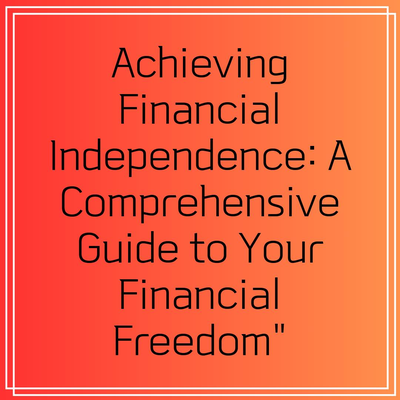Understanding Financial Independence
The quest for
At its core, financial independence means having assets that generate income sufficient to cover your living expenses. This allows individuals to make choices about how to spend their time and resources. Instead of working purely for a paycheck, financially independent individuals can prioritize personal interests, hobbies, or even philanthropic efforts.
The Importance of Financial Literacy
Before embarking on the journey toward
For instance, mastering the basics of budgeting allows you to track expenses, identify areas for potential savings, and allocate resources wisely. Additionally, learning about various investment vehicles—such as stocks, bonds, and real estate—can help you grow your wealth over time. The magic of compounding, where investment gains generate further gains, plays a crucial role in accelerating the path to financial independence.
Defining Your Financial Goals
Setting clear, achievable financial goals is fundamental in the journey toward
Consider breaking your goals into short-term, medium-term, and long-term objectives. Short-term goals may include creating an emergency fund or reducing debt, while long-term goals can encompass purchasing a home or establishing a retirement savings plan. Using the SMART criteria—Specific, Measurable, Achievable, Relevant, and Time-bound—can further enhance the effectiveness of your goal-setting process.
Developing a Robust Budget
One of the foundational steps toward achieving
After assessing your financial situation, identify areas where you can cut costs. Prioritizing essential expenses and eliminating non-essential ones can contribute significantly to your savings goals. Allocate a certain percentage of your income to savings or investments each month to build your wealth over time. It may be beneficial to revisit your budget regularly to adapt to changes in income or life circumstances.
Building an Emergency Fund
An integral part of financial security is having an emergency fund. This fund acts as a safety net for unforeseen expenses, such as medical emergencies, car repairs, or job loss. Having this cushion allows you to navigate financial setbacks without derailing your path toward
Experts recommend setting aside three to six months’ worth of living expenses in an easily accessible account. This fund should be separate from your regular savings, ensuring that it remains untouched until necessary. By establishing an emergency fund, you are taking a significant step in enhancing your financial stability and independence.
Investing Wisely for Wealth Growth
Investing is a crucial component of building wealth and achieving
When investing, it is important to conduct thorough research or seek guidance from financial advisors. Understanding your risk tolerance and time horizon will help you make informed decisions that align with your financial goals. The sooner you start investing, the more time your money will have to grow, bringing you one step closer to financial freedom.
Minimizing Debt and Expenses
Debt can be a significant barrier to achieving
Implementing a debt repayment strategy, such as the avalanche or snowball method, can help you tackle outstanding balances. Furthermore, being mindful of your spending habits and continuously seeking to reduce unnecessary expenses can free up additional funds for savings and investments.
Creating Passive Income Streams
Passive income is a powerful tool in the pursuit of
By establishing multiple sources of passive income, you can create a more resilient financial situation, which can sustain your lifestyle and cover your expenses while you focus on your interests or work towards your passions. This approach not only provides financial security but also enhances the quality of life.
The Role of Retirement Accounts
Retirement accounts are essential tools for anyone aiming for
Maximizing contributions to these accounts, especially when an employer matches contributions, can lead to substantial long-term gains. The sooner you start investing in a retirement account, the more time you will have to accumulate wealth and ultimately secure your financial future.
Regularly Reviewing Your Financial Plan
A comprehensive financial plan should never be static. Regularly reviewing and adjusting your plan is paramount in aligning it with your current goals and circumstances. Life changes, such as job transitions, new family members, or economic fluctuations, can impact your financial trajectory and necessitate adjustments to your strategy.
By consistently evaluating your financial situation, you can stay on track toward achieving
Embracing a Thrifty Lifestyle
Many financially independent individuals adopt a thrifty lifestyle that prioritizes value and smart spending. This approach often entails consciously choosing to live below your means, making intentional purchasing decisions, and seeking out opportunities to save. By embracing frugality, you can bolster your savings and accelerate your journey toward
Practical tips for living thriftily include shopping sales, using coupons, avoiding impulsive purchases, and assessing wants versus needs. A mindful approach to spending not only enhances your financial situation but can also instill a sense of satisfaction and accomplishment in achieving your goals.
The Psychological Benefits of Financial Independence
Achieving
Moreover, financial independence can lead to greater life choices and opportunities. It empowers individuals to explore new career paths, invest in personal development, or even pursue educational endeavors without the constraint of financial pressure. This newfound freedom can lead to a more fulfilling and enriched life.
Conclusion: The Path to Financial Independence
The journey to










